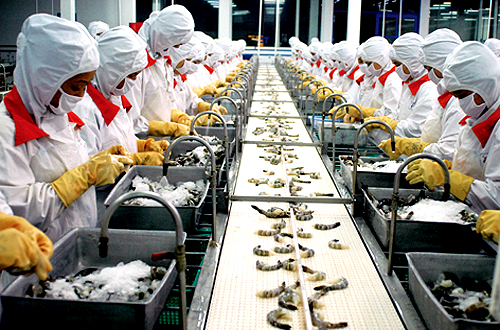Nguyen Nhu Tiep, director of Nafiqad, said China had taken random samples and found hematopoietic and epithelial cell necrosis virus in Vietnamese tiger prawns. This virus is subject to stringent control in China.
The percentage of samples infected with the virus was high so Chinese authorities have announced a temporary ban on raw tiger prawn imports from Vietnam, he said.
However, VASEP and shrimp traders said this move will not affect Vietnamese shrimp.

VASEP general secretary Truong Dinh Hoe said that the ban did not cause much damage as Vietnam did not export raw shrimp to other markets.
He added that “the current problem of Vietnamese shrimp is infant death syndrome (hepatopancreas necrosis disease), so China is afraid, but this disease is not only found in Vietnam, but also in China, India and Thailand.”
Nguyen Van Kich, general director of Cafatex Company, a shrimp exporter, said the import ban of China would not impact production and export activities of Vietnamese enterprises.
Kich doubted exports of Vietnamese materials to China, saying “prices of Vietnamese materials are among the world’s highest, then how can they ‘run’ into China?”
“As far as I know, Chinese traders come to Vietnam to buy unprocessed shrimp on their own and hire facilities in Vietnam to process before shipping it to their home market for sale. Local firms have petitioned the Ministry of Agriculture and Rural Development and relevant agencies to look at this issue,” he added.
Hoe of VASEP noted: “Our supply is now not enough for local processors, so selling unprocessed shrimp is not really a strategy of the Vietnamese seafood industry.”
Enterprises should focus on exporting processed products, he advised.
He informed relevant agencies of Vietnam and China were working with each other to identify the cause of virus infection.
In 2011, Vietnam exported 2,063 tons of unprocessed shrimp through official quotas to China. In the first ten months of 2012, the country exported 568 tons, according to Nafiqad.
So far, raw shrimp has been exported by only five Vietnamese firms. Nafiqad has asked these five companies to declare where they had bought raw tiger prawns so that the agency can collect samples and supervise diseases in order to quickly settle the problem.












